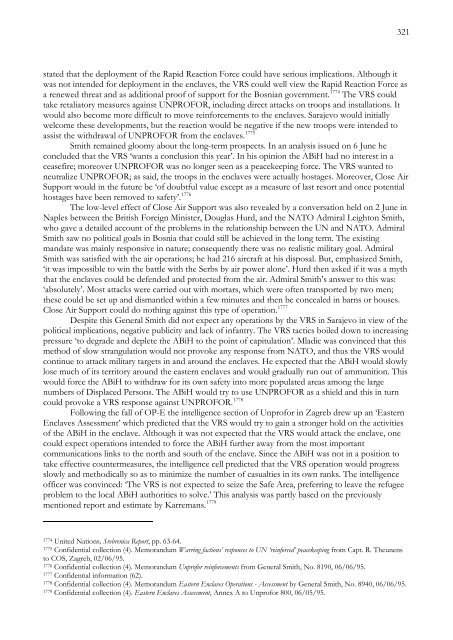C. Wiebes - Intelligence en de oorlog in Bosnië 1992-1995. De rol van de inlichtingen- en veiligheidsdiensten - Engels
C. Wiebes - Intelligence en de oorlog in Bosnië 1992-1995. De rol van de inlichtingen- en veiligheidsdiensten - Engels
C. Wiebes - Intelligence en de oorlog in Bosnië 1992-1995. De rol van de inlichtingen- en veiligheidsdiensten - Engels
- No tags were found...
Create successful ePaper yourself
Turn your PDF publications into a flip-book with our unique Google optimized e-Paper software.
321stated that the <strong>de</strong>ploym<strong>en</strong>t of the Rapid Reaction Force could have serious implications. Although itwas not <strong>in</strong>t<strong>en</strong><strong>de</strong>d for <strong>de</strong>ploym<strong>en</strong>t <strong>in</strong> the <strong>en</strong>claves, the VRS could well view the Rapid Reaction Force asa r<strong>en</strong>ewed threat and as additional proof of support for the Bosnian governm<strong>en</strong>t. 1774 The VRS couldtake retaliatory measures aga<strong>in</strong>st UNPROFOR, <strong>in</strong>clud<strong>in</strong>g direct attacks on troops and <strong>in</strong>stallations. Itwould also become more difficult to move re<strong>in</strong>forcem<strong>en</strong>ts to the <strong>en</strong>claves. Sarajevo would <strong>in</strong>itiallywelcome these <strong>de</strong>velopm<strong>en</strong>ts, but the reaction would be negative if the new troops were <strong>in</strong>t<strong>en</strong><strong>de</strong>d toassist the withdrawal of UNPROFOR from the <strong>en</strong>claves. 1775Smith rema<strong>in</strong>ed gloomy about the long-term prospects. In an analysis issued on 6 June heconclu<strong>de</strong>d that the VRS ‘wants a conclusion this year’. In his op<strong>in</strong>ion the ABiH had no <strong>in</strong>terest <strong>in</strong> aceasefire; moreover UNPROFOR was no longer se<strong>en</strong> as a peacekeep<strong>in</strong>g force. The VRS wanted toneutralize UNPROFOR; as said, the troops <strong>in</strong> the <strong>en</strong>claves were actually hostages. Moreover, Close AirSupport would <strong>in</strong> the future be ‘of doubtful value except as a measure of last resort and once pot<strong>en</strong>tialhostages have be<strong>en</strong> removed to safety’. 1776The low-level effect of Close Air Support was also revealed by a conversation held on 2 June <strong>in</strong>Naples betwe<strong>en</strong> the British Foreign M<strong>in</strong>ister, Douglas Hurd, and the NATO Admiral Leighton Smith,who gave a <strong>de</strong>tailed account of the problems <strong>in</strong> the relationship betwe<strong>en</strong> the UN and NATO. AdmiralSmith saw no political goals <strong>in</strong> Bosnia that could still be achieved <strong>in</strong> the long term. The exist<strong>in</strong>gmandate was ma<strong>in</strong>ly responsive <strong>in</strong> nature; consequ<strong>en</strong>tly there was no realistic military goal. AdmiralSmith was satisfied with the air operations; he had 216 aircraft at his disposal. But, emphasized Smith,‘it was impossible to w<strong>in</strong> the battle with the Serbs by air power alone’. Hurd th<strong>en</strong> asked if it was a myththat the <strong>en</strong>claves could be <strong>de</strong>f<strong>en</strong><strong>de</strong>d and protected from the air. Admiral Smith’s answer to this was:‘absolutely’. Most attacks were carried out with mortars, which were oft<strong>en</strong> transported by two m<strong>en</strong>;these could be set up and dismantled with<strong>in</strong> a few m<strong>in</strong>utes and th<strong>en</strong> be concealed <strong>in</strong> barns or houses.Close Air Support could do noth<strong>in</strong>g aga<strong>in</strong>st this type of operation. 1777<strong>De</strong>spite this G<strong>en</strong>eral Smith did not expect any operations by the VRS <strong>in</strong> Sarajevo <strong>in</strong> view of thepolitical implications, negative publicity and lack of <strong>in</strong>fantry. The VRS tactics boiled down to <strong>in</strong>creas<strong>in</strong>gpressure ‘to <strong>de</strong>gra<strong>de</strong> and <strong>de</strong>plete the ABiH to the po<strong>in</strong>t of capitulation’. Mladic was conv<strong>in</strong>ced that thismethod of slow strangulation would not provoke any response from NATO, and thus the VRS wouldcont<strong>in</strong>ue to attack military targets <strong>in</strong> and around the <strong>en</strong>claves. He expected that the ABiH would slowlylose much of its territory around the eastern <strong>en</strong>claves and would gradually run out of ammunition. Thiswould force the ABiH to withdraw for its own safety <strong>in</strong>to more populated areas among the larg<strong>en</strong>umbers of Displaced Persons. The ABiH would try to use UNPROFOR as a shield and this <strong>in</strong> turncould provoke a VRS response aga<strong>in</strong>st UNPROFOR. 1778Follow<strong>in</strong>g the fall of OP-E the <strong>in</strong>tellig<strong>en</strong>ce section of Unprofor <strong>in</strong> Zagreb drew up an ‘EasternEnclaves Assessm<strong>en</strong>t’ which predicted that the VRS would try to ga<strong>in</strong> a stronger hold on the activitiesof the ABiH <strong>in</strong> the <strong>en</strong>clave. Although it was not expected that the VRS would attack the <strong>en</strong>clave, onecould expect operations <strong>in</strong>t<strong>en</strong><strong>de</strong>d to force the ABiH further away from the most importantcommunications l<strong>in</strong>ks to the north and south of the <strong>en</strong>clave. S<strong>in</strong>ce the ABiH was not <strong>in</strong> a position totake effective countermeasures, the <strong>in</strong>tellig<strong>en</strong>ce cell predicted that the VRS operation would progressslowly and methodically so as to m<strong>in</strong>imize the number of casualties <strong>in</strong> its own ranks. The <strong>in</strong>tellig<strong>en</strong>ceofficer was conv<strong>in</strong>ced: ‘The VRS is not expected to seize the Safe Area, preferr<strong>in</strong>g to leave the refugeeproblem to the local ABiH authorities to solve.’ This analysis was partly based on the previouslym<strong>en</strong>tioned report and estimate by Karremans. 17791774 United Nations, Srebr<strong>en</strong>ica Report, pp. 63-64.1775 Confid<strong>en</strong>tial collection (4). Memorandum Warr<strong>in</strong>g factions’ responses to UN ‘re<strong>in</strong>forced’ peacekeep<strong>in</strong>g from Capt. R. Theun<strong>en</strong>sto COS, Zagreb, 02/06/95.1776 Confid<strong>en</strong>tial collection (4). Memorandum Unprofor re<strong>in</strong>forcem<strong>en</strong>ts from G<strong>en</strong>eral Smith, No. 8190, 06/06/95.1777 Confid<strong>en</strong>tial <strong>in</strong>formation (62).1778 Confid<strong>en</strong>tial collection (4). Memorandum Eastern Enclaves Operations - Assessm<strong>en</strong>t by G<strong>en</strong>eral Smith, No. 8940, 06/06/95.1779 Confid<strong>en</strong>tial collection (4). Eastern Enclaves Assessm<strong>en</strong>t, Annex A to Unprofor 800, 06/05/95.





